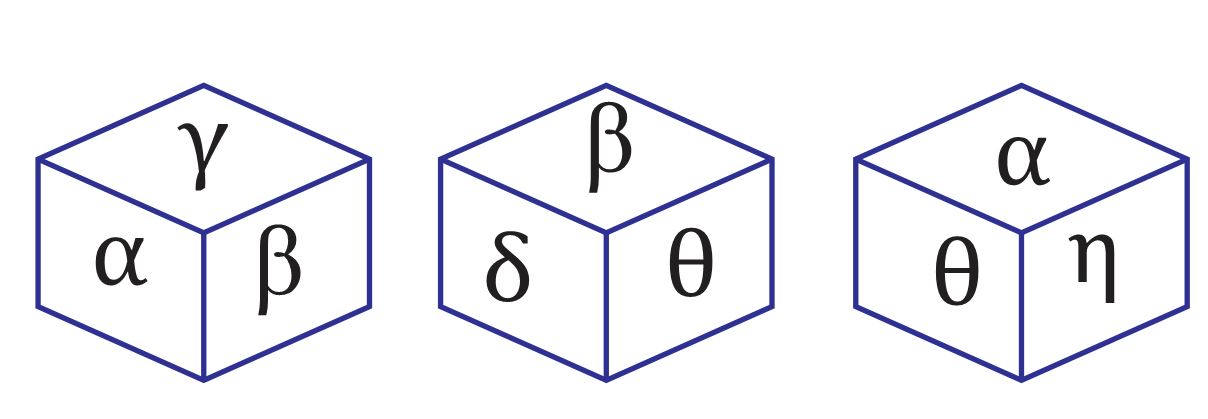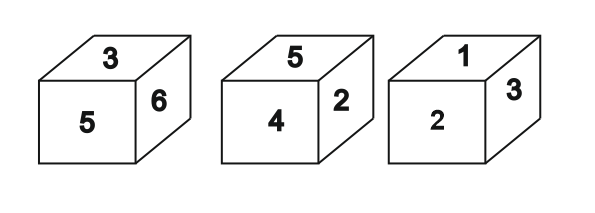Cubes and Dice Practice Question and Answer
8 Q: Four dice positions are shown below. What number will be on the bottom panel if 1 is at the top?

825 05dd38f6cbfcbc45cddee0056
5dd38f6cbfcbc45cddee0056
- 16false
- 23false
- 32true
- 45false
- Show AnswerHide Answer
- Workspace
- SingleChoice
Answer : 3. "2"
Q: Four different positions of a dice are as shown below. What number is opposite to face 3?

1806 05d8daa1d1afb4111d6e49ba1
5d8daa1d1afb4111d6e49ba1
- 14true
- 23false
- 32false
- 46false
- Show AnswerHide Answer
- Workspace
- SingleChoice
Answer : 1. "4"
Q: Three positions of a cube are shown below. What will come opposite to the face containing ‘α’?

1602 05d9dbc9d83cbd37fec65060d
5d9dbc9d83cbd37fec65060d
- 1βfalse
- 2δtrue
- 3nfalse
- 4θfalse
- Show AnswerHide Answer
- Workspace
- SingleChoice
Answer : 2. "δ"
Q: Three forms of a dice are shown below. In this dice which digit will be on the surface opposite to the digit 4?

4008 05de63782c873ec70a678bd75
5de63782c873ec70a678bd75
- 15true
- 21false
- 32false
- 43false
- Show AnswerHide Answer
- Workspace
- SingleChoice
Answer : 1. "5"
Explanation :
 From (i) (ii) and (iii)
From (i) (ii) and (iii)
3 will be opposite of 1
6 will be opposite of 2
4 will be opposite of 5
Q: When two dice are thrown simultaneously, what is the probability that the sum of the two numbers that turn up is less than 12? 1275 05b5cc5ffe4d2b4197774b427
5b5cc5ffe4d2b4197774b427- 135/36true
- 217/36false
- 315/36false
- 41/36false
- Show AnswerHide Answer
- Workspace
- SingleChoice
Answer : 1. "35/36"
Explanation :
Answer: A) 35/36 Explanation: When two dice are thrown simultaneously, the probability is n(S) = 6x6 = 36 Required, the sum of the two numbers that turn up is less than 12 That can be done as n(E) = { (1,1), (1,2), (1,3), (1,4), (1,5), (1,6)(2,1), (2,2), (2,3), (2,4), (2,5), (2,6)(3,1), (3,2), (3,3), (3,4), (3,5), (3,6)(4,1), (4,2), (4,3), (4,4), (4,5), (4,6)(5,1), (5,2), (5,3), (5,4), (5,5), (5,6)(6,1), (6,2), (6,3), (6,4), (6,5) } = 35 Hence, required probability = n(E)/n(S) = 35/36.
Q: Four forms of a dice are shown below. In this dice which word will be on the surface opposite to the world D?

2884 05d7f68ba5d5653223cdca5f9
5d7f68ba5d5653223cdca5f9
- 1Dfalse
- 2Atrue
- 3Bfalse
- 4Cfalse
- Show AnswerHide Answer
- Workspace
- SingleChoice
Answer : 2. "A"
Explanation :
undefined
Q: Three position of a cube are shown below. What will come opposite to face containing ‘5’?

2676 05d8daaee1afb4111d6e49efa
5d8daaee1afb4111d6e49efa
- 11true
- 23false
- 34false
- 46false
- Show AnswerHide Answer
- Workspace
- SingleChoice
Answer : 1. "1"
Q: A coloured cube is cut into smaller cubes if there are 8 colourless cubes, then how many smaller cubes are there?
2084 05e6341d8f1640a77574dc254
5e6341d8f1640a77574dc254- 164true
- 212false
- 324false
- 440false
- Show AnswerHide Answer
- Workspace
- SingleChoice

